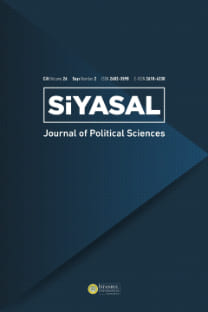Başkanlık, parlamentarizm ve yerel ağlar: özbek ve kırgız siyasal sistemlerinin yeniden düzenlenmesi
Orta Asya ülkeleri Sovyet sonrası dönemde değişmeyen başkanlar ve bu başkanlar etrafında örülmüş otoriter rejimler olarak karakterize edildiler. Başkanlık sistemi, yolsuzluk, nepotizm ve çoğulculuk karşıtı uygulamalar gündeme geldiğinde eleştirilerin ana odağı oldu. Başkanlık sisteminden parla- menter sisteme geçmeyi 10 yıldır planlayan Kırgızistan muhalefeti 2010 itibarıyla Orta Asya için bir ilki gerçekleştirerek parlamenter sisteme geçti. Ancak bu değişim siyasette yapısal bir değişime de yol açtı mı? Bu yazı, Orta Asya’da iktidarların devamlılığı ve değişimini tayin edecek olan kapalı kapılar ardında süregiden bir pazarlık mekanizması mevcudiyetinden hareketle siyasal elitlerin merkezle ilişkisini Özbekistan ve Kırgızistan örneklerinde karşılaştırarak merkezi iktidarın güç kaynakları anlamaya ve analiz etmeye çalışmaktadır.
Presidentialism, parliamentarism and local networks: reformation of the uzbek and kyrgyz political systems
Post-Soviet Central Asian states’ political systems characterized with a high level of authoritarian rule, corruption and nepotism. Kyrgyzstan, by mid 2010, reformed her political structure and accepted parliamentary system as the first country in her region. Since prevalence and the future of presidents’ power in the region involve back-room negotiations amongst the existing elite from various sectors and regions we need to ask ourselves who constitute the elite and what is the basis for their political power? This article aims at exploring the dynamics of political power base by contrasting the two contexts: Kyrgyz Parliamentarian and Uzbek presidential systems.
___
- Abazov, Rafis, Historical Dictionary of Kyrgyzstan, Oxford: The Scarecrow Press, 2004.
- Asankanov, Abylabek, Kyrgyzy: Rost Natsional’nogo Samosoznaniia, Bişkek, Muras, 1997.
- Brinkerhoff, Derick W. ve Arthur A. Goldsmith “Clientelism, Patrimonialism and Deocratic Governance: An Overview and Framework for Assessment and Programming”, Aralık 2002, http://pdf.usaid.gov/pdf_docs/Pnacr426.pdf (Erişim tarihi: 12 Ocak 2011)
- Cogorku Keneş, http://www.kenesh.kg/about/ (Erişim tarihi: 10 Mart 2009)
- Collins, Kathleen, “The Logic of Clan Politics: Evidence from the Central Asian Trajectories,” World Politics, vol. 56 no. 2, Ocak 2004, s..224-61
- Doolotkeldieva, Asel, “Presidential Elections in Kyrgyzstan: Strategies, Context, and Implications”, The China and Eurasia Forum Quarterly, Cilt. 7, No. 3 Kasım 2009, s. 5-10.
- “Four Progressive parties merge into Alga-Kyrgyzstan”, The Bishkek Observer, 16 Eylül 2003, s.4.
- Frye, T., “A Politics of Institutional Choice”, Comparative Political Studies, vol. 30, no. 5, Kasım 1997, s. 523–52.
- Güneş, Hakan, “Post-Sovyet Kazakistan, Kırgızistan ve Özbekistan’da Siyasal Konsolidasyon ve Mobilizasyon Örüntüleri”,Yayınlanmamış Doktora Tezi, İstanbul: Marmara Üniversitesi Sosyal Bilimler Enstitüsü, 2005.
- İtogovıy Doklad o Parlamentskih Vıborah 2010 g. V Kırgızstane, Alyans Liberalnoi Molodeji “Svobodnoe Pokolenie”, 2010. http://www.liberal.kg/files/doc/ITogovyi%20 doklad_FIN_PDF.pdf, (Erişim tarihi: 20 Şubat 2011)
- Joldoshov, Altınbek, “Kırgızistan’da Demokrasi Sorunu”, Praksis, No: 23, 2010’2,s. 173-204.
- Kangas, Roger D., “Uzbekistan, The Karimov Presidency – Amir Timur Revisited”, Sally N. Cummings (der.), Power and Change in Central Asia, London: Routledge, 2002.
- Kerimov, İslam A., “Özbek Modeli”, http://www.tasam.org/index.php?altid=3322; (Erişim tarihi: 04 Aralık 2010)
- Kuzio, Taras, “The Next Revolution?”, Transition-on-line, Kasım 2003, (wwwtol.cz). (Erişim tarihi: 23 Aralık 2010)
- Lane, David, Politics and Society in the USSR, NY: Random House, 1970.
- Levitsky, Steven ve Lucan A. Way, “Elections Without Democracy, The Rise of Competative Authoritarianism”, Journal of Democracy, Vol. 13 No 2, Nisan 2002.
- Libman, Alexander, “The Economic Role of Public Administration in Central Asia: Decentralization and Hybrid Political Regime”, CDSE Mannheim, IE RAS Moscow and ECNU Shanghai, 2008.
- Marat, Erica, “Comparing Pro-Presidential Parties in Central Asia” 12/12/200, 7 issue of the CACI Analyst, http://www.cacianalyst.org/?q=node/4758 (Erişim tarihi: 10 Şubat 2011)
- Marat, Erica, “The Tulip Revolution: Kyrgyzstan One Year After”, Washington: Jamestown and Brookings, 2006.
- O`zbekiston Ekologik Hаrаkаti; http://eco.uz/ (Erişim tarihi: 18 Aralık 2010)
- Parliament of Uzbekistan, http://www.usbekistan.at/publish/uk/cat_index_3.shtml, (Erişim tarihi: 10 Mart 2009)
- Roberts, Sean R., “Patron-Client Politics and Presidential Succession in Central Asia: The Examples of Kazakhstan and Uzbekistan”, Washington, IREX, http://www. roberts-report.com/ (Erişim tarihi: 16 Ocak 2011)
- • Roper, Steven D., “Are All Semipresidential Regimes the Same? A Comparison of Premier-Presidential Regimes”, Comparative Politics, Cilt 34 No 3, Nisan 2004, s. 253-272
- Rothstein, Bo, “Political Institutions: An Overview”, Robert E. Goodin ve Hans-Dieter Klingemann (der.), A New Handbook of Political Science, Oxford: Oxford Un,iversity Pres, 1998.
- Sartori, Giovanni, Comparative Constitutional Engineering, An Inquiry into Structures, Incentives and Outcomes, New York: New York University Pres, 1994.
- Schwartzman, Simon, “Back to Weber: Corporatism and Patrimonialism in the Sev- enties”, James M. Malloy (der.), Authoritarianism and Corporatism in Latin America, Pittsburgh, University of Pittsburgh Press, s. 89-106.
- Senat Olii Majlisa Respublika Uzbekistan; http://www.senat.gov.uz/, (Erişim tarihi: 15 Aralık 2010)
- Shailoo 2010, (Kırgızistan Merkezi Seçim Komitesi 2010 Parlamento Milletvekili Seçimi Sonuçları Raporu) http://cec.shailoo.gov.kg/i-election.asp?ElectionID=137, (Erişim tarihi :17 Aralık 2010)
- “Silent Opposition”, Times of Central Asia, 20 Ocak, 2004, s. 7. Star, F. Frederick, “Clans, Authoritarian Rulers, and Parliaments in Central Asia”, The Silk Road Studies Program, Uppsala University, 2006.
- Temirkulov, Azamat, “Combating Open Society Threats: Regionalism, Nepotism and Corruption, Recommendations for NGOs from the Kyrgyz Republic”, Budapest: Central European University, Center for Policy Studies, 2007.
- Weise, Gavin, “Understanding the Proposed Kyrgyz Parliament”, IFES Briefing Paper, Mayıs 2010.
- Zakon Kırgızskoy Respubliki o Statuse Deputata Cogorku Keneşa Kırgızskoy Res- publiki, Bişkek, 18 Ağustos 2005, no : 151.
- ISSN: 1303-1260
- Yayın Aralığı: Yılda 2 Sayı
- Yayıncı: İstanbul Üniversitesi
